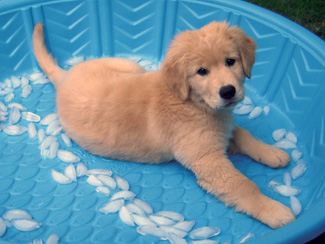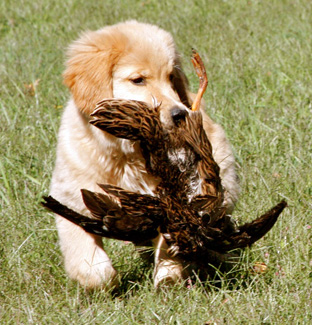What to look for in a puppy
What to look for in a breederHobby Breeder vs. Commercial Breeder
Selecting a private Hobby Breeder Litters of Puppies Buyer Beware! AKC registration does not necessarily mean quality. The AKC will readily agree that quality control is not one of its responsibilities. AKC Registration isn’t enough Health of a PuppyGoldens are not more subject to hereditary problems than other breeds. In fact, in some instances, Goldens have far The knowledgeable breeder is aware of any problem that exists in his breed, and he takes the necessary measures to assure that he uses only sound animals in his breeding program. As in most large breeds, a potential problem in Golden Retrievers is hip dysplasia—a malformation of the hip joint, which can be severe enough to be a disability for the dog. Some dogs have hip dysplasia even though it is not evident to the naked eye. The only way to determine whether a dog is dysplastic is to have its hips x-rayed. The x-ray is performed by a local veterinarian, and then the film is sent to the Orthopedic Foundation for Animals (OFA) or PennHIP for evaluation. A good hobby breeder has all adults x-rayed if he plans on breeding them. Health Clearances Hips and Elbows: Most general practice veterinarians simply do not have the time to become expert radiologists. X-rays taken of a dog at age two years or older are believed to be 95% accurate in diagnosis of the disease. Earlier x-rays are not as accurate as evaluation. You will want to purchase a puppy whose parents have had an x-ray of their hips, and those x-rays evaluated by the experts. The breeder should be happy to provide you with copies of the OFA or PennHIP certificates on both parents. Dogs can be bred whose hips were rated fair, good, or excellent. Research has shown over time that because reputable breeders have bred the best with the best, breeding only those dogs with fair, good or excellent hips, the offspring have had better hips. As a result, fewer and fewer puppies have suffered hip dysplasia as adults. You should never purchase a puppy from parents who do not have their hips cleared with the Orthopedic Foundation for Animals (OFA) or PennHIP. While no disability may be visible in the parents, a minor problem with them may be compounded in the breeding. And, yes, it is fair to ask why this breeder did not have x-rays taken?
The reputable breeder will happily provide you with copies of the ophthalmologist examination reports or a CERF (Canine Eye Registry Foundation) certificate proving that the parents of your puppy are free from hereditary eye disease. You should not purchase a puppy without evidence that the parents are free of hereditary eye disease. Heart: Another hereditary disease that all Goldens should have their heart screened for is Subvalvular Aortic Stenosis (SAS). All prospective breeding animals should be examined by a board-certified veterinary cardiologist or by an internist with cardiovascular training. If a murmur is detected on auscultation (listening), additional diagnostic tests are available and may be recommended; however, even this does not conclusively rule out heart disease, as some mild but hereditary forms may be indictable except on necropsy. Animals with hereditary heart disease should not be used for breeding. This rather extensive reference to hereditary problems is not meant to alarm you—but to help you select your Golden Retriever with as much information as possible. So ask for health clearances from the breeder. ConclusionThe serious breeder knows the faults and virtues of his dogs. The perfect dog has not yet been born. The challenge is breeding two animals and producing one that is even better than either of its parents. This is the goal of the serious breeder. When it comes to selecting breeding stock, the dedicated breeder will not excuse the faults you might excuse in your pet because of your love for him. The responsible breeder attempts to breed only the best to the best. This is critical in the area of temperament. A faulty temperament is an inexcusable fault in a Golden retriever. To paraphrase Joan Tudor, the well-known British breeder and authority on Golden Retrievers: “An animal may have a fault in structure, and still rightfully claim the name Golden Retriever, but an animal with a fault in temperament cannot be called a Golden Retriever. Pleasant temperament is the overwhelming characteristic of the breed, and bidability, the desire to please, a close second.” Recommended BooksTwo excellent books on the Golden Retriever are:
You might also find the following books helpful with a new puppy:
Breeder Referral
After reading this information, you may call if you have further questions. If you are seeking to add a Golden Retriever to your home, we will also be happy to discuss the virtues of acquiring an older dog as a pet, as opposed to a puppy. There are many situations where such an option is an ideal solution. With regard to purchasing a puppy, you should be prepared to make a reservation. Golden Retrievers are ever-growing in popularity, and often reputable breeders will have their puppies reserved before they are fully seven weeks old (49 days), an age when pups are often placed in homes (some breeders hold puppies longer). It is worth mentioning that only infrequently will you find puppies of the established breeders advertised in newspapers. Most of their puppies are sold through referrals from other breeders and their many satisfied buyers. DisclaimerThe Lenape Golden Retriever Club is a nonprofit organization. The club, as a courtesy, provides a puppy referral service. The Club makes no representations, warranties or guarantees, either express or implied, as to the quality, health, temperament, etc., of any puppy. Further, the Club is not endorsing any particular breeder or making any representations as to the breeder’s breeding practices or the quality, health, temperament, etc., of the dogs mated. Nor do we endorse or assume responsibility for dogs that are placed by our members for adoption. Again, this is merely a referral service in which we provide names of members who have available puppies. We hope you find a pet that is right for you and your family. The information on this page is provided compliments of The Lenape Golden Retriever Club. We get many calls about puppies as this is a popular breed. The information on this Lenape Golden Retriever Club web site will hopefully provide you with information about this wonderful breed. Our hope is that you have information about purchasing a puppy and choosing the right breeder, so that you will be able to make the right choice for you and your lifestyle. If any of our members have puppies available or have an upcoming litter, we will provide you with that information. Members often have a waiting list for their puppies. If there are no puppies available, we suggest you attend a dog show, where you can meet with breeders and see their dogs. Lenape GRC Puppy Referral Contacts: |
GRCA Member Club of Golden Enthusiasts

.jpg) Human companionship is an essential requirement for a Golden Retriever. If you are convinced that this is the breed for you, you should take the time to make a sensible purchase. You are making an investment, which over the years may be substantial (a recent survey quoted a figure of nearly $8000 for a lifespan of 11 years for a medium sized dog). It will cost the same whether you buy a good dog or a poor specimen—it may even cost you more if you purchase an animal lacking the hardiness that should be typical of a Golden Retriever.
Human companionship is an essential requirement for a Golden Retriever. If you are convinced that this is the breed for you, you should take the time to make a sensible purchase. You are making an investment, which over the years may be substantial (a recent survey quoted a figure of nearly $8000 for a lifespan of 11 years for a medium sized dog). It will cost the same whether you buy a good dog or a poor specimen—it may even cost you more if you purchase an animal lacking the hardiness that should be typical of a Golden Retriever. The Hobby Breeder
The Hobby Breeder fewer serious problems than some other breeds due to the early and continuing efforts of the dedicated breeders nationwide. (As a word of consolation to those who are now thinking that purebred dogs have too many problems, it is of interest that some hereditary problems were first discovered in mixed-breed dogs. Genetics has no prejudice.)
fewer serious problems than some other breeds due to the early and continuing efforts of the dedicated breeders nationwide. (As a word of consolation to those who are now thinking that purebred dogs have too many problems, it is of interest that some hereditary problems were first discovered in mixed-breed dogs. Genetics has no prejudice.) Eyes: Golden Retrievers as a breed (among other breeds, too) have some incidence of two types of hereditary eye disease—hereditary cataract and progressive retinal atrophy, diseases of the inner eye—as well as hereditary problems, which affect the outer eye. Conscientious breeders all over the country make it a practice to have their breeding stock checked, at least annually, by a veterinary ophthalmologist, not just a general practice veterinarian.
Eyes: Golden Retrievers as a breed (among other breeds, too) have some incidence of two types of hereditary eye disease—hereditary cataract and progressive retinal atrophy, diseases of the inner eye—as well as hereditary problems, which affect the outer eye. Conscientious breeders all over the country make it a practice to have their breeding stock checked, at least annually, by a veterinary ophthalmologist, not just a general practice veterinarian. If you are interested in purchasing a Golden Retriever, or have been considering breeding or training a Golden you already own, the Lenape Golden Retriever Club will be happy to assist you in any way possible.
If you are interested in purchasing a Golden Retriever, or have been considering breeding or training a Golden you already own, the Lenape Golden Retriever Club will be happy to assist you in any way possible.